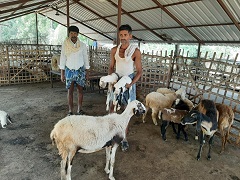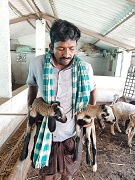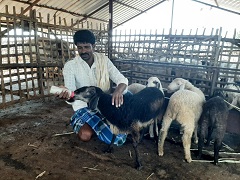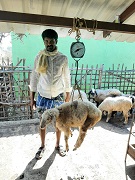The growing demand for sheep meat coupled with attractive price for live-weight cost of Rs. 300 to Rs. 350/kg in the urban and peri-urban areas in metros and large towns is attracting many farmers to adopt intensive feeding of sheep with better breeds.


The lack of nutrition in the early phase of growth in lambs reduces the immunity and increases the susceptibility to diseases resulting in lower body weight gains and high mortality. It is mainly due to low plane of nutrition as the breeds of sheep have very limited ability to produce sufficient milk for promoting optimum growth in lambs.
One of the major concerns is the lower body weight gain in lambs during the pre-weaning phase (90 - 100 days). The technological intervention of supplementary feeding through Milk Replacer containing highly digestible quality ingredients can address the issue. The supplement is designed for the growth and development of young nursing animals.


A number of studies on the use of Milk Replacer during the pre-weaning phase on the Research Farm at ICAR-National Institute of Animal Nutrition and Physiology, Bengaluru, Karnataka indicates its effectiveness in promoting health and growth in lambs. Its cost Vis-a-Vis the cost of prevailing market cost of live-weight showed its use to be economical besides improving the health and growth of young lambs. To test the technology under the farmers’ system of management, the Institute carried out a field trial on its use in the peri-urban areas of Bengaluru, Karnataka.
The Progressive Farmers rearing NARI Suwarna were identified in the Sira Taluk of Tumkur District with the help of the State Animal Husbandry Department, Government of Karnataka. The NARI Suwarna is a popular breed known for its prolificacy with high percentage of twining where early lamb feeding is a major concern. The farmers were provided with the formulated Milk Replacer at ICAR-NIANP with the instructions on its usage. The young lambs of two-to-three weeks were selected and divided into two groups - Control Group was maintained with the routine farmers feeding practice and the Treatment Group was supplemented with the Milk Replacer at the rate of 40g/day for a period of 60 days. Both the groups were reared under the same management systems.
On recording the body weights at weekly intervals, the farmers found the Milk Replacer to be quite readily accepted and the lambs took 3 to 4 days to get used to it and once acquainted; they were readily consuming it. The Milk Replacer fed lambs were active, healthy and gained higher weight than the control group. The treatment group supplemented with Milk Replacer had significantly higher weight gains than the control group (150 g versus 70 g/day). The economics of supplementation revealed that for every kg of Milk Replacer supplemented, lambs gained 1.5 to 2.0 kg live-weight and in terms of cost, it works out to be Rs. 150/- spent through Milk Replacer would fetch an income of Rs. 450/- assuming an average weight gain of 1.5 kg at the rate of Rs. 300/kg, live-weight.
The benefit cost ratio worked out to be around 3.0. The pilot scale testing of the Milk Replacer supplementation was encouraging. The farmers expressed their willingness to adopt the product. The technology needs to be popularized amongst the larger number of farmers around the urban and peri-urban areas engaged in fattening sheep for mutton production and identifying suitable agencies to produce and market the product.
(ICAR-National Institute of Animal Nutrition and Physiology, Bengaluru, Karnataka)







फेसबुक पर लाइक करें
यूट्यूब पर सदस्यता लें
X पर फॉलो करना X
इंस्टाग्राम पर लाइक करें